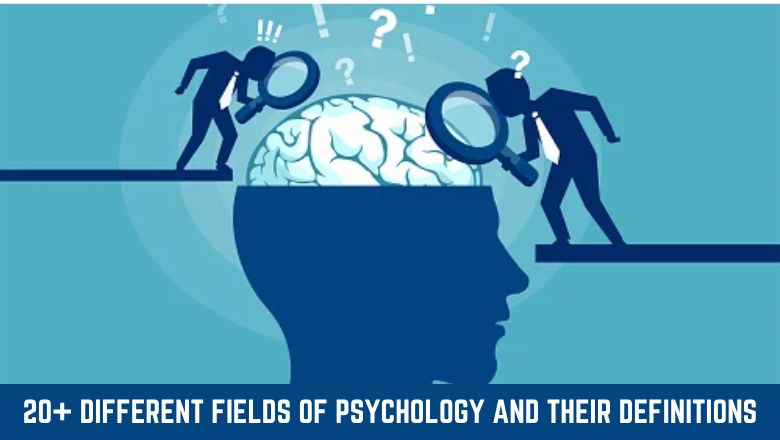In this article, you will get to know all details about “20+ Different Fields of Psychology and their Definitions“.
- Use and Importance of Subfields of Psychology:
- Different Fields of Psychology and their Definitions:
- 1: Abnormal Psychology:
- 2: Biological Psychology:
- 3: Child Psychology:
- 4: Clinical Psychology:
- 5: Cognitive Psychology:
- 6: Comparative Psychology:
- 7: Community Psychology:
- 8: Counseling Psychology:
- 9: Developmental Psychology:
- 10: Educational Psychology:
- 11: Environmental Psychology:
- 12: Forensic Psychology:
- 13: Health Psychology:
- 14: Media Psychology:
- 15: Personality Psychology:
- 16: Social Psychology:
- 17. Family Psychology:
- 18. School Psychology:
- 19. Sports Psychology:
- 20. Cross-Cultural Psychology:
- 21. Experimental Psychology:
- 22. Industrial-Organizational Psychology:
- What are the 3 Branches of Psychology?
- What is the Best Branch of Psychology?
- What are the 7 Types of Psychology?
- Important PDF Files:
Psychology has many subfields, each with its own unique characteristics. The purpose of this article is to discuss all the major different fields of psychology as well as their definitions.
It has been discussed in the previous article that people define psychology differently based on their views in “Introduction to psychology” and “History of psychology.”.
Due to the fact that psychology cannot be merged into a single field, there are many branches of psychology. All of them will be discussed in this article.
Use and Importance of Subfields of Psychology:
For each type, there is a unique application and advantage, and it is appropriate for the right place and person.
There are researchers and psychologists who work on specific and specialized aspects of each type of psychology.
Different Fields of Psychology and their Definitions:
Through this subdivision, we will be able to gain a greater understanding of different psychology fields and careers.
In the following sections, I will discuss each branch of psychology and its definition.
1: Abnormal Psychology:
“Abnormal” normally refers to something that doesn’t happen frequently or isn’t normal.
Behavior that is abnormal does not follow the rules. Our society defines abnormal behavior as behavior that doesn’t meet expectations. It is imperative that people like these are dealt with immediately. This type of behavior is studied in Abnormal Psychology.
This branch of psychology deals with people’s unusual behaviors. It is the psychologist’s job to determine why and what caused the abnormality, and then determine how to recover from it in the most effective way.
It is necessary for these patients to receive clinical treatment.
2: Biological Psychology:
Life is the subject of biology, as we all know.
When biology and psychology are combined, it is called biological psychology. Physiological psychology and psychobiology are also terms used to describe it.
Behavior is analyzed from a biological perspective. There is an influence of the nervous system on behavior in this situation.
Biological psychology studies the brain in order to understand human behavior.
3: Child Psychology:
Child psychology is primarily concerned with the behavior and mentality of children. Psychologists study the development of children’s bodies, minds, emotions, and social relationships.
One of the most complex branches of psychology is child psychology.
It is possible for a child psychologist to work in a variety of ways:
- A psychologist who specializes in abnormal children.
- Psychologists who specialize in developmental psychology.
- Psychologists who work in schools and educational settings.
4: Clinical Psychology:
The term clinical refers to the observation, therapy, and treatment of sick people. Clinical psychology is important from a medical perspective.
A clinical psychologist is primarily concerned with treating individuals with mental illnesses and abnormal behavior.
Instead of psychological treatment, Psychiatrists use medicines to treat the patient’s symptoms.
If you are interested in the medical field but don’t have the skills to begin in another medical field, I would recommend pursuing this field.
5: Cognitive Psychology:
The term cognitive refers to anything that has to do with cognition. Experiments and observations are used to gain a better understanding of someone’s thoughts, perceptions, emotions, etc.
According to psychology, cognitive psychology is the study of a person’s mental development, such as memory, perspective, creativity, and perception.
6: Comparative Psychology:
Animals are the focus of comparative psychology. Comparative psychology studies the psychology of animals. In addition to studying the mental level and behavior of humans, we also study the mental level and behavior of animals.
Psychology generally focuses on human nature and behavior, but comparative psychology focuses on animals who share many traits with humans.
7: Community Psychology:
Most of my readers are familiar with the term community. It can be summarized as the society in which we live.
We can learn about society and human behavior through the concept of community psychology. A great deal of influence is exerted by society on individuals.
It mainly focuses on the problems of society and many other factors that have direct or indirect effects on a person’s life.
The goal of community psychology is to find solutions to the problems of its members and protect their rights.
8: Counseling Psychology:
Counseling refers to giving advice or making recommendations.
The psychology of counseling addresses the normal problems people face, such as choosing a career.
Counseling psychologists can also help people who suffer from stress or depression. Their goal is to lead them down the road to normal life by helping them recover from trauma.
9: Developmental Psychology:
An individual’s development throughout their life cycle is studied by a developmental psychologist. As well as physical development, mental, social, emotional, psychological, and intellectual development are also included.
Developmental psychology seeks to understand how and why humans change over time.
10: Educational Psychology:
Psychologists study how humans learn in the field of educational psychology. Human learning is studied from both a cognitive and a behavioral perspective in this field.
The study of the human execution of learning is carried out in this field.
11: Environmental Psychology:
Environmental psychology examines the relationship between human behavior and the environment. In this field, humans are concerned with how the environment affects them.
12: Forensic Psychology:
Psychological knowledge and legal understanding are combined in forensic psychology.
In essence, it is the relationship between psychology and social justice. Generally, it deals with criminal cases.
13: Health Psychology:
Essentially, health psychology relates to our health sector. The study of health psychology examines how our behavior and environment influence our health.
Health psychologists also study the reasons why a patient fails to follow proper medication prescribed by their doctors if they have a disease and receive proper medical treatment.
14: Media Psychology:
The psychology of media is primarily concerned with how media affects human behavior. It is the study of how people interact with and react to the media as well as the impact that media has on our society that is the focus of a media psychologist.
15: Personality Psychology:
It is called Personality Psychology, which studies how one’s personality and its different elements differ from person to person.
In personality psychology, feelings, thoughts, emotions, expressions, and behaviors are examined in relation to an individual’s identity.
16: Social Psychology:
The study of social psychology focuses on the interaction between society and human beings. An important part of this field is the study of how social environments affect humans.
17. Family Psychology:
The field of family psychology is considered to be an applied psychology field. Family psychology is essential to building strong relationships with our families.
As a family adjusts to a given environment, it learns how to manage and adjust itself to it.
In family psychology, we can create bonds and networks with our family members by solving their problems.
It is the responsibility of family psychologists to ensure that the family is brought up well. To move forward with their lives in a peaceful manner, newlywed couples tend to seek advice from a family psychologist.
18. School Psychology:
The field of school psychology is considered to be a professional one by psychologists. In our schools, school psychology programs can be of great benefit to both students and teachers, but especially to adults. It will benefit not only the young but also the old, as well as our schools and society as a whole.
The importance of school psychology can’t be overstated from the perspective of students. Aside from improving their learning capabilities, school psychology also improves their social and emotional behavior.
The importance of this is even greater from the perspective of a teacher. There is an explanation of how teachers can be effective teachers. There are both direct and indirect effects of the teaching style on students.
Since teachers are responsible for their student’s academic and professional success, they need to understand school psychology.
19. Sports Psychology:
Sport, from a psychological standpoint, is primarily about your physical and mental well-being, both of which are crucial for your performance.
In sports psychology, you develop a sense of teamwork in your personality and act more appropriately with your coaches and captains.
Studying sports psychology can sharpen your mind and enable you to focus on your goals. Concentration will be improved. This teaches you how to handle pressure and stress.
20. Cross-Cultural Psychology:
Recently, cross-cultural psychology has emerged as a branch of psychology. Culture plays a major role in understanding human behaviors.
It analyzes an individual from a cultural perspective by comparing and contrasting cultures.
21. Experimental Psychology:
Feedback is carefully examined in experimental psychology, logically and methodically. It is also concerned with our mental exertion in addition to our emotions.
22. Industrial-Organizational Psychology:
It is classified as applied psychology because it applies certain psychological principles to a specific sector. Generally, it aims to improve an organization’s well-being.
Employee behavior and commitment to their jobs are studied by occupational psychologists.
It is my hope that you are well versed in different fields of psychology after reading this article. Different fields have their own applications and apply to specific fields.
Feel free to leave a comment if you have any questions or would like more information about any topic in Psychology. Thank you very much.
What are the 3 Branches of Psychology?
In American psychology, Behaviorism, Psychoanalysis, and Humanistic Psychology were the three dominant paradigms.
What is the Best Branch of Psychology?
Industrial-Organizational Psychology is the highest-paid branch of psychology because it helps companies run more efficiently. It’s a win-win situation for everyone!
What are the 7 Types of Psychology?
Following are the 7 types of psychology:
- Biological psychology
- Cognitive psychology
- Social-cultural psychology
- Humanistic psychology
- Evolutionary psychology
- Psychodynamic psychology
- Learning (Behavioral) psychology
Important PDF Files:
The following pdf files have been requested by visitors, so I am uploading them.
20 Branches of Psychology and their Definition PDF |
Download PDF File |
10 Branches of Psychology PDF |
Download PDF File |
Fields of Psychology PDF |
Download PDF File |
7 Types of Psychology PDF |
Download PDF File |
Major Branches of Psychology PDF |
Download PDF File |
Areas of Psychology PDF |
Download PDF File |
Subfields of Psychology PDF |
Download PDF File |
Keep reading and learning with Rehmat Ullah.

